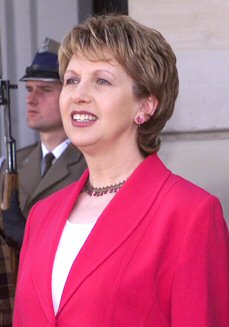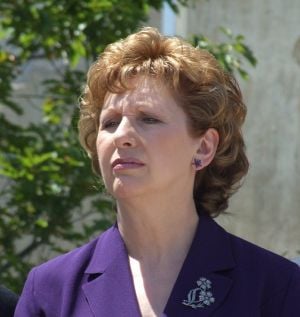Mary McAleese
Mary Patricia McAleese born 27 June 1951) is the eighth, and current President of Ireland. She is Ireland's second female president and the world's first woman to succeed another woman as an elected head of state. She is the first person born in Northern Ireland to become President of the Irish Republics. She was first elected Ireland's eighth president in 1997 and won a second term, without a contest, in 2004. Born in Belfast, prior to becoming president she was a barrister, journalist and academic and the first women to become Pro-Vice Chancellor of Queen's University.
Background
McAleese was born Mary Patricia Leneghan in Ardoyne, Belfast where she grew up. She is the oldest of nine children.[1]. Her family was forced to leave the area by loyalists when the Troubles broke out. Her father owned a public house. On one occasion, their home was "machine-gunned" while they were attending Mass; on another, her deaf brother was "badly beaten."[2] She was educated at St. Dominic's High School, the Queen's University of Belfast (from which she graduated in 1973), and Trinity College Dublin. She graduated with her LL.B in 1973. Later, she gained the MA, MIL and was elected a Fellow of the Royal Society of Arts.[3] She was called to the Northern Ireland Bar in 1974 and is today also a member of the Bar in the Republic of Ireland. In 1975 at the age of 24 she was appointed Reid Professor of Criminal Law, Criminology and Penology in Trinity College, succeeding Mary Robinson (a succession that would repeat itself twenty years later, when McAleese assumed the presidency).
During the same decade she acted as legal adviser to, and a founding member of, the Campaign for Homosexual Law Reform, but she left this position in 1979 to join RTÉ as a journalist and presenter as a reporter and presenter for their 'Today Tonight' programme. In 1976 she married Martin McAleese. Also during the 1970's she acted as legal counsel for the "anti-divorce campaign."[4] In 1981 she returned to the Reid Professorship, but continued to work part-time for RTÉ for a further four years. In 1987 she became Director of the Institute of Professional Legal Studies at Queen's, Belfast. In the same year she stood, unsuccessfully, as a Fianna Fáil candidate in the general election.
McAleese was a member of the Catholic Church Episcopal Delegation to the New Ireland Forum in 1984 and a member of the Catholic Church delegation to the North Commission on Contentious Parades in 1996. She was also a delegate to the 1995 White House Conference on Trade and Investment in Ireland and to the subsequent Pittsburgh Conference in 1996. In 1994, she became the Pro-Vice Chancellor of the Queen's University of Belfast, the first woman and second Catholic to hold the position. Prior to becoming president in 1997 McAleese had also held the following positions:
- Director of Channel 4 Television.
- Director, Northern Ireland Electricity.
- Director, Royal Group of Hospitals Trust.
- Founder member of the Irish Commission for Prisoners Overseas.
Unusually, however, unlike former Presidents, she had "never held an important government or legislative office"[5] which is why biographer Justine McCarthy decribes her as an an "outsider."
Presidency
In 1997 McAleese defeated former Taoiseach Albert Reynolds in an internal, party election held to determine the Fianna Fáil nomination for the Irish presidency.
Her opponents in the 1997 presidential election were Mary Banotti of Fine Gael, Adi Roche (the Labour candidate) and two independents: Dana Rosemary Scallon and Derek Nally.
She won the seat for presidency with 45.2 percent of first preference votes. In the second and final count against Banotti, she won 58.7 percent of preferences. On November 11 1997, she was inaugurated as the eighth President of Ireland, the first time in history that a woman had succeeded another woman as an elected head of state anywhere in the world.
McAleese's initial seven year term of office ended in November 2004, but she announced on 14 September of that year that she would be standing for a second term in the 2004 presidential election. Following the failure of any other candidate to secure the necessary support for a nomination, the incumbent president stood unopposed, with no political party affiliation, and was declared elected on 1 October. She was officially re-inaugurated at the commencement of her second seven year term on 11 November. McAleese's very high job approval ratings were widely seen as the reason for her re-election, with no opposition party willing to bear the cost (financial or political) of competing in an election that would prove very difficult to win.
McAleese has said that the theme of her presidency is "building bridges" which was her 1997 campaign slogan.[6] The first individual born in Northern Ireland to become President of Ireland, President McAleese is a regular visitor to Northern Ireland, where she has been on the whole warmly welcomed by both communities, confounding the critics who had believed she would be a divisive figure. She is also an admirer of Queen Elizabeth II, whom she came to know when she was Pro-Vice Chancellor of Queen's. It is said to be one of her major personal ambitions to host the first ever visit to the Republic of Ireland by a British head of state. In March 1998, McAleese announced that she would officially celebrate the Twelfth of July as well as Saint Patrick's Day, recognizing the day's importance among Ulster Protestants. She also incurred some criticism from the Irish Roman Catholic hierarchy by taking communion in an Anglican (Church of Ireland) Cathedral in Dublin. In May 2008 she became the first Head of State to address the Church of Ireland General Synod.[7]
Commitment to Dialogue and Consensus
On 27 January 2005, following her attendance at the ceremony commemorating the sixtieth anniversary of the liberation of Auschwitz concentration camp, she caused controversy by making reference to the way in which some Protestant children in Northern Ireland had been brought up to hate Catholics just as European children "for generations, for centuries" were encouraged to hate Jews.[8][9][10] These remarks caused outrage among unionist politicians. McAleese later apologised,[11] conceding that, because she had criticised only the sectarianism found on one side of the community, her words had been unbalanced.
On 22 May 2005, she was the Commencement Speaker at Villanova University in Philadelphia, Pennsylvania, U.S. The visit prompted protests by conservatives due to the President's professing heterodox Roman Catholic views on homosexuality and women in priesthood. She was the commencement speaker at the University of Notre Dame on 21 May 2006. In her commencement address, among other topics, she spoke of her pride at Notre Dame's Irish heritage, including the nickname the "Fighting Irish."
Since 19 November 2005, she is the longest-serving current female elected Head of State following the retirement of Chandrika Kumaratunga of Sri Lanka.
On 3 May 2007, she was awarded the The American Ireland Fund Humanitarian Award.
On 3 June 2007 she attended the canonization in Rome of Saint Charles of Mount Argus, her fifth visit to the Vatican in two years.
On 31 October 2007 she was awarded an honorary doctorate of laws from the University of Otago, New Zealand.
President Mary McAleese is a member of the Council of Women World Leaders, an International network of current and former women presidents and prime ministers whose mission is to mobilize the highest-level women leaders globally for collective action on issues of critical importance to women and equitable development.
President McAleese spoke about the importance of identity, conflict and reconciliation in the paradigm of family life as a model for interreligious dialogue in the contemporary world.
“In some of the most inhospitable of circumstances the Churches have been the carers for the bereaved and wounded, the constant persuaders for peace, and the unobtrusive but determined builders of healthy cross-community and cross-border relationships.”
- ↑ Jackson-Laufer, page 285
- ↑ Marquardt and Berger, page 124.
- ↑ Jackson-Laufer, page 285.
- ↑ Spreng, page 204.
- ↑ Spreng, page 204
- ↑ Spreng, page 205.
- ↑ Ryan, Greg. 2008. Church can nurture seeds of peace, says McAleese. Church Times. Issue 7575. May 23. Retrieved January 16, 2009.
- ↑ Transcript of speech
- ↑ McAleese row over Nazi comments. BBC News (2005-01-28). Retrieved 2007-02-18.
- ↑ McAleese: Protestant children taught to hate Catholics. breakingnews.ie (2005-01-27). Retrieved 2007-09-01.
- ↑ McAleese 'sorry' over Nazi remark. BBC News (2005-01-29). Retrieved 2007-02-18.
ReferencesISBN links support NWE through referral fees
- Bourke, Angela. 2002. The Field day anthology of Irish writing. Vols. 4-5, Irish women's writing and traditions. Washington Square, N.Y.: New York University Press. ISBN 9780814799062 * Jackson-Laufer, Guida M. 1999. Women rulers throughout the ages: an illustrated guide. Santa Barbara, Calif: ABC-CLIO. ISBN 9781576070918.
- McAleese, Mary. 1999. Love in chaos of Northern Ireland: spiritual growth and the search for peace in Northern Ireland. New York: Continuum. ISBN 9780826411372.
- McCarthy, Justine. 1999. Mary McAleese: the outsider : an unauthorised biography. Dublin: Blackwater Press. ISBN 9781841314419.
- Mac Mánais, Ray. 2004. The road from Ardoyne: the making of a president. Dingle: Brandon. ISBN 9780863223334.
- McGarry, Patsy. 2008. First citizen: Mary McAleese and the Irish presidency. Dublin: O'Brien. ISBN 9781847170873.
- Marquardt, Michael J., and Nancy O. Berger. 2000. Global leaders for the twenty first century. SUNY series in management-communication. Albany, NY: State University of New York Press. ISBN 9780791446614.
- Spreng, Jennifer E. 2004. Abortion and divorce law in Ireland.9780786416752 Jefferson: McFarland.
External links
- Official biography
- BBC Extended interview with President McAleese (audio) (interview of 2/3/2003)
- AIF Humanitarian Award speech
- President Mary McAleese with Council of Women World Leaders
Notes
http://www.churchtimes.co.uk/content.asp?id=57156
| Persondata | |
|---|---|
| NAME | McAleese, Mary |
| ALTERNATIVE NAMES | Mhic Ghiolla Íosa, Máire (Irish); Leneghan, Mary |
| SHORT DESCRIPTION | 8th President of Ireland |
| DATE OF BIRTH | 27 June 1951 |
| PLACE OF BIRTH | Belfast, Northern Ireland |
| DATE OF DEATH | |
| PLACE OF DEATH | |
Credits
New World Encyclopedia writers and editors rewrote and completed the Wikipedia article in accordance with New World Encyclopedia standards. This article abides by terms of the Creative Commons CC-by-sa 3.0 License (CC-by-sa), which may be used and disseminated with proper attribution. Credit is due under the terms of this license that can reference both the New World Encyclopedia contributors and the selfless volunteer contributors of the Wikimedia Foundation. To cite this article click here for a list of acceptable citing formats.The history of earlier contributions by wikipedians is accessible to researchers here:
The history of this article since it was imported to New World Encyclopedia:
Note: Some restrictions may apply to use of individual images which are separately licensed.

